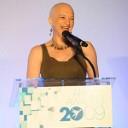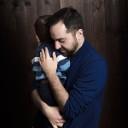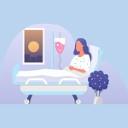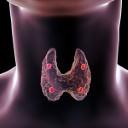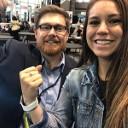-
What It’s Like to Get a “C” in Graduate School
I was afraid that my thyroid cancer diagnosis would derail my graduate school plans. Instead, it helped shape my career path.
by Carly Flumer
-
On Cancer and Identity
The first time Liza Bernstein was diagnosed with cancer, she wouldn't allow it to be part of her identity. After her third cancer diagnosis, she became an advocate for other patients.
by Liza Bernstein
-
Nothing but Time
A father with metastatic kidney cancer embraces moments with his 3-year-old son while pondering how he'll be remembered.
by Adam P. Stern
-
When Cancer Becomes an Unwanted Priority
Amanda Rose Ferraro's leukemia diagnosis forced her to spend time at the hospital away from her 3-year-old-son. She calls focusing on her health and leaving her son “the hardest thing I have ever had to do.”
by Amanda Rose Ferraro
-
“Congrats! You Have the ‘Good’ Cancer”
Many people know thyroid cancer as a cancer type with a relatively good prognosis, but the disease still has profound effects on patients and survivors, writes thyroid cancer survivor Carly Flumer.
by Carly Flumer
-
Finding Support in Unlikely Places
After her diagnosis with ovarian cancer, Patricia Anne Ward noticed that some friends and family pulled away. She found connection outside her usual circles.
by Patricia Anne Ward
-
A Researcher Attends a Conference, This Time as a Patient Advocate
My most meaningful moments at my first cancer research conference came from embracing my experience as a patient—not as a researcher.
by Jamie Aten
-
Walking Back From Cancer
An American expat in Norway describes how a favorite walking trail aided him during treatment and recovery.
by Steven Ford
-
Coping With Trauma
Nearly six years after being diagnosed with stage IV colon cancer, disaster psychologist Jamie Aten is still learning new ways of coping with the trauma stemming from his diagnosis and treatment.
by Jamie Aten
-
What Not to Say to a Cancer Patient
When visiting a friend or family member who is sick, it's good to leave platitudes at the door.
by Michael Gavaghen
Cancer Talk
Treatment Combination Improves Survival in EGFR-positive Lung Cancer
Adding chemotherapy to targeted therapy improves outcomes for people with advanced EGFR-positive non-small cell lung cancer.
by Sandra Gordon
Lessons From 20 Years Living With CancerMultiple myeloma survivor Jonathan Gluck reflects on uncertainty, and the scientific progress that has kept him living with cancer for more than two decades.
by Eric Fitzsimmons
The Enduring Importance of Cancer Disparities ResearchOpening session from AACR conference highlights how perseverance and adversity have informed cancer disparities research over the years.
by Eric Fitzsimmons
Most Cancer Survivors Don’t Meet Healthy Diet GoalsDespite research linking fruits and vegetables to cancer survival, many people do not change their eating habits after diagnosis.
by Darlene Dobkowski


